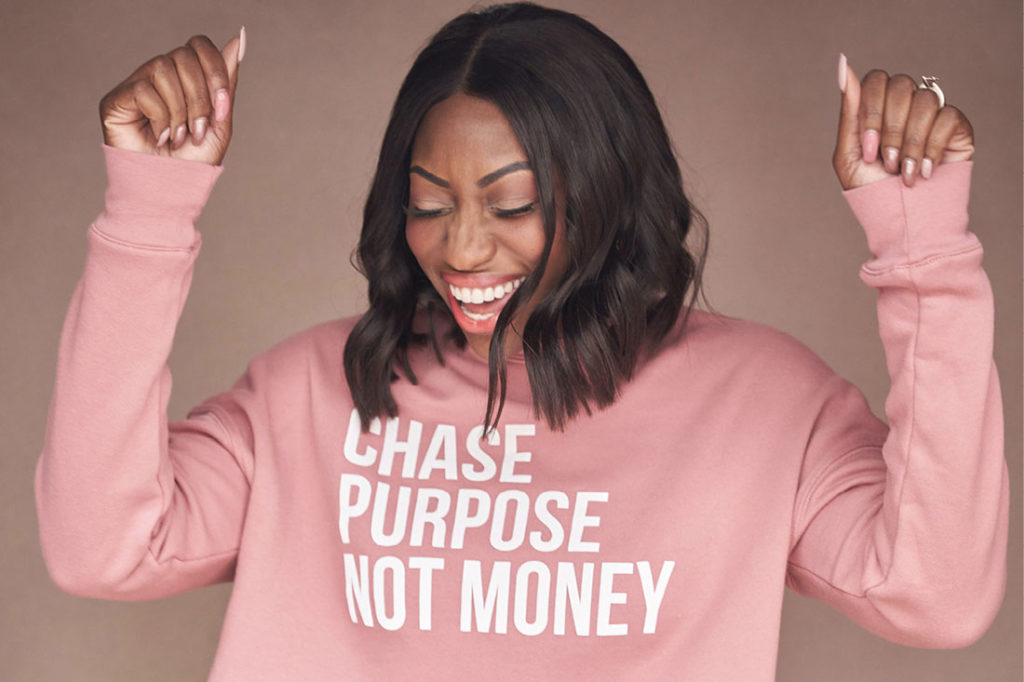Patrice Washington was on food stamps the day she turned down a job offer from Steve Harvey. Sleeping on her brother’s couch and desperate for steady income, Washington remembers sitting across from the entertainer and his manager, grateful for the offer, while the words “I can’t do it” spilled out of her mouth almost automatically.
To be clear, Harvey and his team were like family to Washington, who had worked as Harvey’s intern years earlier while studying at the University of Southern California. “I was supposed to be there for 60 days and ended up staying for two-and-a-half years,” Washington says. “It was an amazing experience.”
In the years that followed, Washington built a booming seven-figure real estate and mortgage brokerage. It was an impressive feat to accomplish right out of college and one she skillfully crafted through her own ambition, work ethic and intelligence. And it was gone overnight.
The crash of the housing market in 2008 and subsequent recession decimated her business, leaving her on welfare and food stamps and—eventually—sitting across from a generous Harvey who offered to create a job with the sole purpose of helping her get back on her feet.
“I went in excited and, as I was listening to the opportunity, it didn’t sound like it had anything to do with personal finance education, which is what I really felt led and called to do,” Washington says.
In the back of her mind, Washington was also mulling over a call she received just moments before arriving at Harvey’s office. The president of the nonprofit where she volunteered as a personal finance educator for kids wanted her for a new role as a financial management consultant, where she would help people with their budgets and credit reports. The catch: It wouldn’t be available for nine months.
”I didn’t even ask how much money it would be,” Washington says. “I thought, This is a dream! When can I start?”
So, as she sat across from Harvey, Washington knew her answer needed to be no.
“In true Steve Harvey fashion, he said, ‘You’re broke, ain’t ya?’” she says. “I told him I didn’t want to come in and commit and have him create this space for me, and then not stick with it because it’s not what I want to do. It was an opportunity I knew my family needed, but I couldn’t bring myself to say ‘yes’ and get trapped in a scenario I knew I would not be fulfilled in.”

It’s this courage to say “no”—to opportunities, to money and to fame—when it doesn’t align with her values or her calling that has shaped Washington’s career in the face of adversity and uncertainty. Turning down an attractive and timely opportunity with Harvey’s organization is one of many times throughout the years that she has stood her ground against the odds.
“People sometimes ask me if I feel like that was the most responsible thing,” Washington says. “It’s the thing that got me here, so I don’t regret it at all. It’s a choice I would make over and over again, and it’s a choice I have made at different junctures in my career when people have made me offers, or tried to give me opportunities that look great and sound wonderful on paper, but aren’t in alignment with what I feel called to do. I’ve turned down hundreds of thousands of dollars, easily, over the last five years for this same reason.”
Blind Spot Protection
Saying “no” as she did takes guts and no small amount of confidence, but Washington is transparent about the fact that she has not always been so self-assured. As a child, she remembers a relative telling her she was “the ugly one” in the family, a nickname that embedded itself deep into her psyche and impacted her well into her adult years.
“I grew up feeling very ugly and insecure,” she says. “I was the ugly duckling in the family and I was not the cute friend. I really leaned into achievement because, if nothing else, I was the smart one or the one who could figure it out.”
In her early 20s, her husband, who was still her boyfriend at the time, recommended she try therapy to address the impact her limiting beliefs were having on their relationship. It was this first step toward relinquishing the stranglehold of past hurts that unlocked the possibility of her future.
“I learned to adopt a new definition of forgiveness, which is giving up the possibility of a better past,” she says. “The past is the past; there’s nothing I can do to rectify that. I can only go forward.”
Emotional labor through therapy sessions was a key component of Washington’s ability to earn her first seven-figure income at the age of 25, and confidently close sales in her mid-20s. It’s also why she continues to invest in external support, checking in with her personal therapist on a biweekly basis and joining her husband Gerald at couples therapy every other month to avoid what she calls “blind spots” in her life, relationships and business. When a crisis pops up, she increases the frequency of her sessions even more. Personal finance and therapy may not seem to go hand-in-hand, but in her experience, those who ignore their traumas are often the ones who end up making poor money management decisions.
“Greatness is not created in isolation,” she says. “There is no way we can do it by ourselves and there is always someone who knows more than you do who can be of support to you. So, I’m going to have therapy until I die.”
Redefining Wealth
Hitting rock bottom was clarifying for Washington. She reached a defining moment in 2009, when she discovered a revelatory Bible passage in Proverbs 17:16 that reads, “What good is money in the hands of a fool if they have no desire to seek wisdom?” Washington realized that while she had been armed with knowledge and had access to money, she had not been acting wise.
As she began digging into the meanings of the words she had chased for so long, a surprising definition from the 12th century caught her eye. Wealth meant material possessions, of course, but it had also been synonymous with well-being and happiness. It was a turning point that ignited a passion and a new business path.
“What I really wanted was peace,” she says. “I think that’s what a lot of people desire when they say ‘I want to make six or seven figures.’ So, for me, the pursuit of wisdom is asking how I can live my life in a way that I’m well, happy, fulfilled and peaceful. And, at some point, ask how I can allow myself to be content with that and not in a constant relentless pursuit of more and more and more.”
Redefining Wealth, Washington’s international community of people committed to weaving together their career, health, home and personal finances, was built on this new holistic definition. It was a seismic pivot from real estate, and while she felt confident in her new direction, the nagging feelings of self-doubt continued to plague her.
“I’ve never considered myself fearless,” she says. “I’ve learned to coexist with fear or cooperate with it and allow it to be more fuel and acknowledge it. I don’t want to stuff it down and it sabotage me later.”
Metabolizing fear, rather than allowing it to take root, is an exercise she describes in her most recent book, Redefine Wealth for Yourself. In one exercise, a “What If vs. What Is,” she asks readers to fold a journal page in half lengthwise and write the “what ifs”—or things that create anxiety and stress—on the left, and write the “what is”—or things that remind them of what they have already overcome, who they have served, and what their belief system says about the situation—on the right.

“That usually is the thing that lets me get up from my morning quiet time recharged, knowing I’ve got this,” she says.
And if the “what ifs” do come true, Washington has found that listing them out makes her uniquely prepared. With contingency plans at the ready, worst-case scenarios are not the end of the story, but rather one more plot twist.
“Sometimes you may have the best idea in your head and then you put it out there and the market is like, ‘Yeah, I don’t want that,’” she says. “If that worst-case scenario happens, guess what? You can pivot and turn it into something else. That’s how I live my life. I’ve had too many lows at this point in my life to just let anything knock me out and keep me down. I’m always going to find a ‘what is’ and get back up.”
The Wake-Up Call
For the past decade, Washington has been known as America’s Money Maven, helping people shift from debt management to money mastery. She has written five books, appeared on national TV shows, been featured in national media outlets like CNBC and Essence, and hosted her own radio segment on a nationally syndicated show. But even transformational career shifts that are born from scripture and rock-bottom experiences can be subject to pivots, and it was one of those flashy guest appearances—this time on The Dr. Oz Show—that signaled to her that her calling was shifting.
“We were having this conversation about saving on groceries and it was one of those still, small voices that hits you, and I thought, I don’t want to talk about saving on groceries anymore,” she says.
To really move the wealth needle for people, she knew she needed to address bigger concepts than coupons, credit scores and budgeting. In other words, she believes they need to be consciously living.
“When I went from having a seven-figure business to scraping up change in the last recession and ended up on welfare and food stamps, I had to do more than just save on groceries,” she says. “The truth is, in order for me to rebuild my life, there were so many other things that were going on behind the scenes. It wasn’t just the surface things I kept being asked about.”
Her new approach meant the conversation would be about chasing purpose not wealth, and teaching others about the “six pillars” she’s defined that impact financial behaviors. Each of the pillars—Fit, People, Faith, Space, Work and Money—are constructed to help people see how their mental fitness, relationships, beliefs, the structure of their life, and what they spend their days doing, dramatically impact their connection and engagement with money.
Her new aim is to help people move into a more meaningful direction, where they find themselves aligned with their own purpose and pursuing not just the type of wealth that builds nest eggs, but the wealth of a life well-lived.
“I think there’s an opportunity for many of us who define success beyond just money and material possessions to truly build great careers and businesses based on leading with purpose,” she says. “I don’t have a desire to be a public success and a private failure.”
Opportunity, Full Circle
Washington turned 40 earlier this year. These days, she is leaning into the unknown. Untethered from any particular modality, she finds satisfaction in all of her work—from hosting a podcast to writing books—but insists that if she feels led to end any of those endeavors tomorrow, she will. Achievement addiction is something she has battled most of her life, and her newest challenge is to discover what it is like to simply love herself apart from what she has accomplished.
That’s a big ask for someone who made her first sale in the third grade and has continued to reinvent her career ever since, but Washington is committed. As a personal finance expert, refusing to find her identity in unnecessary numbers was the most important (and difficult) place to start.
“I realized I was making unhealthy attachments to certain numbers, whether that be the number on the scale or my credit score,” she says. “I don’t want to be driven by all these things.”
She’s also settling back into the power of saying no. For now, that means taking an entire month off of work and trusting that the team she empowered to run her business can handle their tasks. It means rearranging the family calendar to bring her daughter or husband with her on location when appropriate, to give them an understanding of her work and the impact it has on the world. And in the fleeting experience of parenthood, it means silencing her phone to celebrate every moment, often with her teenage daughter’s latest flavor obsession at the local Crumbl Cookies store.
Responsibly taking a break from work to enjoy life’s simple moments has required just as much bravery as walking away from attractive but misaligned opportunities through the years. Those experiences, however, have taught Washington that saying “no” now doesn’t mean the answer will be “no” forever.
In 2014, while in the process of launching her second book, Washington revisited the Steve Harvey organization—this time as a guest on his radio show. Her one-time interview was a hit, and soon she was invited to lead a weekly segment on The Steve Harvey Morning Show, a partnership that lasted four years.
“If it doesn’t fit where I am or what I desire in this stage of my life, it’s OK to say ‘no’ because what’s for me will be for me,” Washington says. “The Steve Harvey opportunity came back around years later, bigger and better than I could have imagined, but I had to say ‘no’ and release any attachment first, and then allow it to come back around. If something is supposed to be for you, it will find its way back to you.”
For Washington, pursuing wealth that is rooted in conscious wisdom has given her a chance to devote time and resources to her life’s most important investments: well-being, joy and, most of all, family. Pivoting, she has discovered, isn’t quite so scary when you know who will be there waiting for you when the dust settles.
“At the end of my life, I’m going to remember the fun I have in the car eating Crumbl cookies with my daughter,” she says. “So, I’m trying to figure out: How do I scale joy? I’ve figured out how to scale my business, but how do I scale joy? That’s what I want to do this next decade and beyond.”
This article originally appeared in the November/December 2021 Issue of SUCCESS magazine. Photos ©Bobby Quillard





